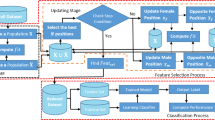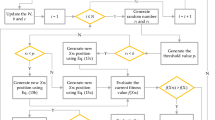Abstract
In this paper, random-opposition-based learning (ROBL) is proposed. ROBL is a generalized version of opposition-based learning (OBL). ROBL introduces randomness in OBL. ROBL is applied for some metaheuristics and artificial neural network. The examples are provided with preliminary results.
Access this chapter
Tax calculation will be finalised at checkout
Purchases are for personal use only
Similar content being viewed by others
References
Hertz, J.: Introduction to the Theory of Neural Computation. Basic Books, vol. 1 (1991)
Glover, F.W., Kochenberger, G.A. (eds.).: Handbook of Metaheuristics (Vol. 57). Springer Science, Business Media (2006)
Eberhart, R., Kennedy, J.: A new optimizer using particle swarm theory. In: Micro Machine and Human Science, 1995. MHS95., Proceedings of the Sixth International Symposium on. pp. 39–43, IEEE (1995)
Storn, R., Price, K.: Differential evolutiona simple and efficient heuristic for global optimization over continuous spaces. J. Glob. Optim. 11(4), 341–359 (1997)
Holland, J.H.: Genetic algorithms. Sci. Am. 267(1), 66–72 (1992)
Dorigo, M., Birattari, M., Stutzle, T.: Ant colony optimization. IEEE Comput. Intell. Mag. 1(4), 28–39 (2006)
Rechenberg, I.: Evolution strategy: Natures way of optimization. In: Optimization: Methods and applications. possibilities and limitations, pp. 106–126. Springer, Berlin Heidelberg (1989)
Karaboga, D.: An idea based on honey bee swarm for numerical optimization, (Vol. 200). Technical report-tr06, Erciyes university, engineering faculty, computer engineering department (2005)
Mirjalili, S., Mirjalili, S.M., Lewis, A.: Grey wolf optimizer. Adv. Eng. Softw. 69, 46–61 (2014)
Mirjalili, S., Gandomi, A.H., Mirjalili, S.Z., Saremi, S., Faris, H., Mirjalili, S.M.: Salp swarm algorithm: A bio-inspired optimizer for engineering design problems. Adv. Eng. Softw. (2017)
Tizhoosh, H.R.: Opposition-based learning: a new scheme for machine intelligence. In: Computational Intelligence for Modelling, Control and Automation, 2005 and International Conference on Intelligent Agents, Web Technologies and Internet Commerce, International Conference on, vol. 1, pp. 695–701. IEEE (2005)
Ali, M.M., Khompatraporn, C., Zabinsky, Z.B.: A numerical evaluation of several stochastic algorithms on selected continuous global optimization test problems. J. Glob. Optim. 31(4), 635–672 (2005)
Bansal, J.C., Sharma, H., Nagar, A., Arya, K.V.: Balanced artificial bee colony algorithm. Int. J. Artif. Intell. Soft Comput. 3(3), 222–243 (2013)
Blake, C., Merz, C.J.: UCI Repository of Machine Learning Databases (1998)
Author information
Authors and Affiliations
Corresponding author
Editor information
Editors and Affiliations
Rights and permissions
Copyright information
© 2020 Springer Nature Singapore Pte Ltd.
About this paper
Cite this paper
Bairathi, D., Gopalani, D. (2020). Random-opposition-based Learning for Computational Intelligence. In: Tuba, M., Akashe, S., Joshi, A. (eds) Information and Communication Technology for Sustainable Development. Advances in Intelligent Systems and Computing, vol 933. Springer, Singapore. https://doi.org/10.1007/978-981-13-7166-0_11
Download citation
DOI: https://doi.org/10.1007/978-981-13-7166-0_11
Published:
Publisher Name: Springer, Singapore
Print ISBN: 978-981-13-7165-3
Online ISBN: 978-981-13-7166-0
eBook Packages: Intelligent Technologies and RoboticsIntelligent Technologies and Robotics (R0)




